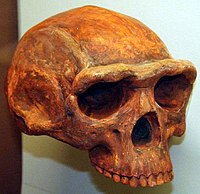Homo erectus
Ìrísí
| Homo erectus | |
|---|---|

| |
| Homo erectus, Natural History Museum, Ann Arbor, Michigan | |
| Ipò ìdasí | |
| Ìṣètò onísáyẹ́nsì | |
| Ìjọba: | |
| Ará: | |
| Ẹgbẹ́: | |
| Ìtò: | |
| Ìdílé: | |
| Ìbátan: | |
| Irú: | H. erectus
|
| Ìfúnlórúkọ méjì | |
| †Homo erectus (Dubois, 1892)
| |
| Synonyms | |
|
† Pithecanthropus erectus | |
Homo erectus (from the Latin ērĭgĕre, "to put up, set upright") tabi eniyan anaro je is an extinct iru ida ti hominidi ti kosimo to bere ni Africa—to fan kiri de China ati Java—lati opin Pliocene epoch de ipari Pleistocene, bi egbegberun odun 1.8 de 1.3 million seyin.[1]

|
Àyọkà yìí tàbí apá rẹ̀ únfẹ́ àtúnṣe sí. Ẹ le fẹ̀ jù báyìí lọ tàbí kí ẹ ṣàtúnṣe rẹ̀ lọ́nà tí yíò mu kúnrẹ́rẹ́. Ẹ ran Wikipedia lọ́wọ́ láti fẹ̀ẹ́ jù báyìí lọ. |
Itokasi
[àtúnṣe | àtúnṣe àmìọ̀rọ̀]- ↑ Hazarika, Manji (16-30 June, 2007). "Homo erectus/ergaster and Out of Africa: Recent Developments in Paleoanthropology and Prehistoric Archaeology".

